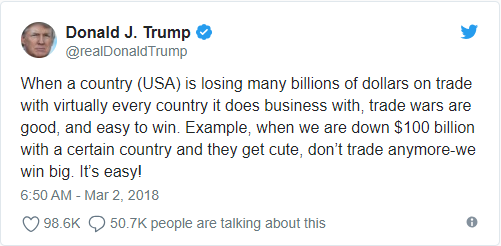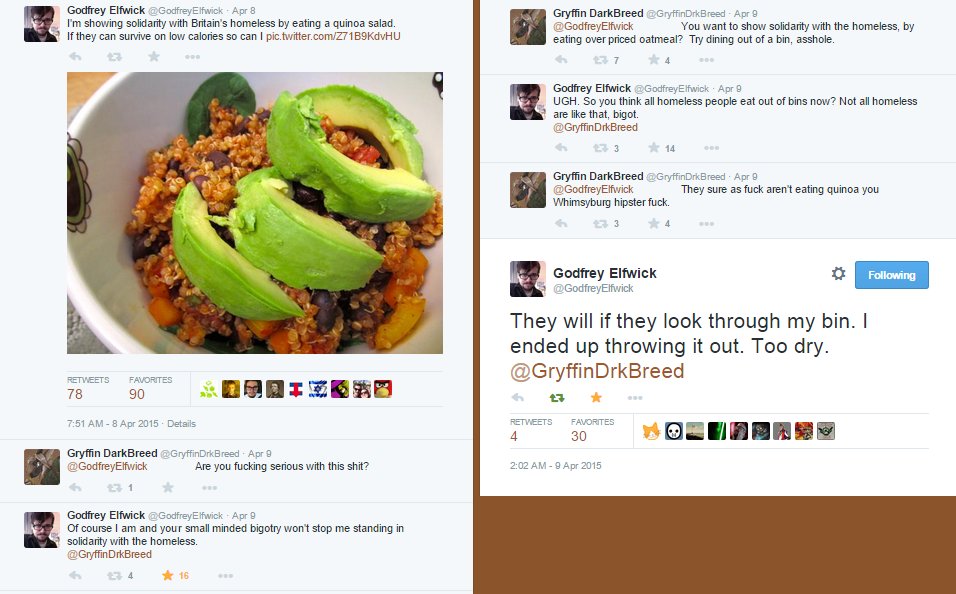BBC Earth Lab
Published on 7 Jun 2013Are we still evolving? Have we stopped? How will we know? James May answers this burning question on evolution.
Subscribe to Earth Lab for more fascinating science videos – http://bit.ly/SubscribeToEarthLab
James May’s Q&A: With his own unique spin, James May asks and answers the oddball questions we’ve all wondered about from ‘What Exactly Is One Second?’ to ‘Is Invisibility Possible?’
Here at BBC Earth Lab we answer all your curious questions about science in the world around you. If there’s a question you have that we haven’t yet answered or an experiment you’d like us to try let us know in the comments on any of our videos and it could be answered by one of our Earth Lab experts.
July 28, 2018
Is Evolution Over? | Earth Lab
QotD: “And are we doing okay?”
“And are we doing okay?”
Waiters have all started talking like preschool teachers in the past several years. It is perplexing. It makes me want to do something shocking and violent, but instead I usually just reply with something like:
“Well, we are, last we checked, not, in fact, plural. And we are therefore slightly confused by our insistence upon addressing us as though we had a mouse — or mice? — in our pocket.”
(I only do this if I am alone, inasmuch as it tends to make dinner conversation awkward when your date shrinks into her seat in mortification.)
Kevin D. Williamson, “You and Who Else?”, National Review, 2016-10-02.
July 27, 2018
“Tariffs are the classic example of government interventions with concentrated benefits and dispersed costs”
Robert Higgs on what he describes its supporters as “waging the trade war to end all trade wars”:
… even as Trump spouts venerable fallacies to justify and seek support for his destructive trade policies and related ad hoc actions, he and his supporters have sometimes offered a strange defense of their tactics: they purport to be seeking, at the end of the game, universal free trade, a world in which all countries have abandoned tariffs, quotas, subsidies, and other government intrusions in international exchange. In Wilsonian terms, they claim to be waging the trade war to end all trade wars. The idea is that by raising U.S. tariffs, they will induce other governments to lower and ultimately eliminate their own.
Of course, this rationale may be nothing more than wily claptrap, tossed out as a rhetorical bone to Republicans who favor freer trade. The administration’s actions to date certainly give no indication that it is aiming at global free trade. On the contrary. So the Wilsonian gambit may consist of nothing but hot air.
But if Trump and his trade advisers actually take this tactic seriously, they are deluding themselves.
First, and surely obviously, U.S. tariff increases will not induce other governments to lower their own, but to raise them, as the EU, China, Mexico, Canada, and other trading partners have already demonstrated. That’s why it’s called a trade war — because the “enemy” shoots back. History has shown repeatedly, most notably in the early 1930s, in the wake of the Smoot-Hawley Tariff Act of 1930, that such trade wars only spiral downward, choking off more and more trade, despoiling the international division of labor in accordance with comparative advantage, and thereby diminishing real income in all the trading countries.
Second, the prospect of the U.S. government’s ever abandoning tariffs is slim to none. Tariffs are the classic example of government interventions with concentrated benefits and dispersed costs. This character makes them attract great support from protected special interests and little opposition from the general public — including other producers — when they are enacted or extended. They are easy for politicians to put in place and diabolically difficult for anyone to eliminate. Although the costs are great — much greater than the benefits for the economy as a whole — hardly anyone’s costs are great enough to justify mounting a potent political attack on the tariffs.
People who get tariffs put in place to protect them in the first place are well positioned to marshal strong opposition to any political attempt to eliminate these taxes on consumers who buy from competing, foreign suppliers. Consumers rarely know anything about why foreign goods are priced as they are, and producers, in general, are usually not affected enough by tariffs on imported raw materials and components to justify well-funded politicking against them.
Ludendorff’s Last Swing I THE GREAT WAR Week 209
The Great War
Published on 26 Jul 2018All of Germany’s recent offensives have been building up to Operation Hagen: An offensive in Flanders that was to divide the Allies and drive the British off the continent. But this week German High Command realizes that they don’t have the manpower left to even start the offensive.
Toronto’s proposed handgun ban is a feelgood/do nothing distraction
Every time there’s a tragedy, there are calls from the local media for politicians to “do something”. Politicians are hard-wired to want to “do something” even without prompting. They want (and need, for electoral purposes) to be seen to be “doing something”, if only to divert any blamecasting away from themselves. The most recent tragedy was a senseless shooting on Toronto’s Danforth in the Greektown district. The shooter, who was either killed by police or committed suicide shortly after the attack, was apparently not a legal gun owner, and under current gun laws would not have been able to obtain a handgun. So, in the wake of the tragic deaths and injuries, Toronto city council jumped into action to be seen “doing something”. Chris Selley explains why the proposed ban of handgun and ammunition sales in the city will not make a difference, except to punish non-criminals:
The whiz-bang solution on everyone’s lips — from Mayor Tory to city councillors to the Toronto Star’s and Globe and Mail’s editorial boards and the usual activists — is to ban handguns. Tory admits there is no “magic wand” that will solve Toronto’s gun problem. But still he asks: “Why does anyone in this city need to have a gun at all?”
The idea has a very superficial appeal. We all wish the Danforth shooter hadn’t managed to get a hold of a gun. Toronto is having a bad year for shootings — not much worse than last year, but at the wrong end of a distinct and steady five-year-trend. (At this point in 2014 there had been 101 shootings and 127 fatalities; so far in 2018 there have been 228 shootings and 308 fatalities.) It is understandable (if not entirely creditable) that the Danforth shooting would have rapidly intensified demands for something to be done: the victim count was high, and it happened in a wealthy part of town where it would have been easy to pretend there wasn’t a problem at all.
Still, the limitations of a “handgun ban” are both many and obvious. When Canadian police forces occasionally report on the sources of crime guns, they often find the vast majority have been smuggled across the border. In Toronto nowadays, the number is reportedly more like 50 per cent; the rest of the supply comes from licensed handgun owners who sell them on illegally — a spectacularly risky thing to do, as any used in crimes would be instantly traced back to the registered owner, but apparently worth it to some.
But we all know how permeable the Canada-U.S. border is. If we made it impossible to own a handgun legally in Canada, is there any reason to suspect the cross-border flow couldn’t regain its market share? Furthermore, CTV reported Wednesday that the Danforth shooter’s handgun was prohibited — i.e., it could never have been licensed in Canada — and that he had obtained it from some gang associates. If true, his carnage illustrates the limitations of handgun bans better than it does their efficacy.
Urban Combat – Room Breaching & Clearing – US Army (2011)
Military History Visualized
Published on 10 Mar 2017This video gives a brief overview on room breaching and clearing techniques based on the US Army Field Manual FM 3-06.11 from June 2011.
Military History Visualized provides a series of short narrative and visual presentations like documentaries based on academic literature or sometimes primary sources. Videos are intended as introduction to military history, but also contain a lot of details for history buffs. Since the aim is to keep the episodes short and comprehensive some details are often cut.
» SOURCES «
Headquarters, Department of the Army: ATTP 3-06.11 (FM 3-06.11) – Combined Arms Operations in Urban Terrain (June 2011)
Headquarters, Department of the Army: FM 3-21.8 – The Infantry Rifle Platoon and Squad (March 2007)
QotD: All pizza is local
When it comes to pizza, you like what you like; and the weird regionalized nature of pizza suggests that we are most likely to like what we know. Real travellers are aware that it is almost impossible to anticipate what you might get ordering pizza outside its twin cultural homes of Italy and North America. Try it in the U.K.: any sort of two-dimensional horror might materialize. Is that yogurt? Endive? Are those eggs? To the depraved British, it makes sense, like Marmite.
Colby Cosh, “The Edmonton pizza hypothesis”, National Post, 2016-10-03.
July 26, 2018
The Trump tariffs are working exactly as designed
That is, they’re becoming a drag on the economy and will take away a lot of the economic activity that was stimulated by the tax cuts enacted earlier. Warren Meyer says that it’s time that congress reclaimed the tariff powers it has outsourced to the executive branch over the years:
I Know Congress Hates To Challenge A President of Its Own Party, But…
…Congress simply has to pare back the tariff authority it has delegated the President. It is simply insane that Trump can just unilaterally impose 20% tariffs on foreign automobiles, a $200 billion new tax on US consumers.
It is appalling to see Trump following the usual blue model of economic regulation, imposing one intervention after another, each meant to fix the unintended consequences of the last intervention. Steel tariffs increased costs to domestic auto makers, so Trump proposes tariffs on foreign autos. When tariffs result (inevitably) in counter-tariffs on US agricultural exports, Trump proposes more agricultural subsidies. People (not me) lament gridlock in government and want more fluid lawmaking — well here it is. And it sucks. It is mindless and reactive and emotional and totally ignorant of economics.
These tariffs, when combined with earlier actions, will result in tax increases on consumers that swamp the tax cuts Trump and the Republicans were so proud of last year.
Jon Gabriel on the most recent “fix” for one of those unintended consequences:
A few months back, President Trump declared that “trade wars are good, and easy to win.” Now, just as nearly every economist on the left and right predicted, Americans are being hurt.
The White House slapped tariffs on imported steel and aluminum. China retaliated with planned tariffs on soybeans, meats and various agricultural products. Mexico, Canada and the European Union also struck back at farm goods and other U.S. exports.
A smart leader would notice his mistake and end the destructive policy. Instead, Trump declared that “tariffs are the greatest” and created a multibillion-dollar federal program to mitigate a small part of the mess he created.
Since Agriculture Secretary Sonny Perdue estimated $11 billion in damage to the industry, he announced a $12 billion payoff to make up the difference.
The administration used emergency executive powers created during the Great Depression; that way Congress wouldn’t get to weigh in.
“This is obviously a short-term solution that will give President Trump time to work on a long-term trade policy and deal to benefit agriculture as well as all sectors of the American economy,” Perdue told reporters.
It’s certainly short-term, but hardly a solution. Trade deals and networks are disrupted, farmers can’t plan for the future, and non-agricultural industries are still losing money. Not to mention all the American consumers watching prices rise on all sorts of household goods.
But red states have a lot of farmers and the midterms are just three months away. Maybe borrowing a few billion dollars will hide enough economic pain to convince voters to keep Republicans in power for two more years.
Isaac Asimov – Laws of Robotics – Extra Sci Fi – #2
Extra Credits
Published on 24 Jul 2018Asimov is famous for coining the Three Laws of Robotics, but to him they weren’t the “answer” to how robots could be used in the future — they were an intentional reflection of humanity’s potential failings.
Forgotten History: The Capture of Fort Douaumont
Forgotten Weapons
Published on 26 Jun 2018http://www.patreon.com/ForgottenWeapons
Welcome to out first episode of Forgotten History! This will be an occasional series looking at interesting events and places in military history. We will begin with the capture of Fort Douaumont on February 25, 1916…
This video was made possible by Military History Tours, and it is the first of a bunch you will be seeing from their Spring 2018 tour of American WW1 battlefields in France. If you are interested in seeing places like this (or WW2, or Korea, or many others) firsthand yourself with a guided tour, check them out:
QotD: Protecting the truth
No one ever heard of the truth being enforced by law. Whenever the secular arm is called in to sustain an idea, whether new or old, it is always a bad idea, and not infrequently it is downright idiotic.
H.L. Mencken, Minority Report, 1956.
July 25, 2018
Forgotten History: The Underground Hell of Fort Vaux
Forgotten Weapons
Published on 24 Jul 2018http://www.patreon.com/ForgottenWeapons
With the surprise capture of Fort Douaumont in February 1916, the French reinforced all the remaining forts around the city of Verdun, and would hold them all successfully for many months. In fact, the only other fort in the area to fall would be Fort Vaux, in June of 1916.
In the chaos of the early battle, orders had actually gone out to evacuate Vaux and destroy it, but these were countermanded, and the fort remained a major lynchpin of French defenses in the sector. Critically, before they could be removed, demolition charges set in the fort’s main gun turret were detonated by a massive German shell, destroying the weapon.
In May, German advances seriously threatened the fort, and a new commander was assigned – Major Sylvain Eugene Raynal. Upon arrival, he found the fort in a terrible condition – heavily damaged by German bombardments and hugely overcrowded with as many as 500 soldiers, most of them wounded and sheltering in the fort (it had been designed to garrison 150 men). Shelling had broken through the fort’s walls in several places, and unbeknownst to Raynal or his men, the water cistern had been damaged and was nearly empty despite its gauge reading substantial levels of water.
The climactic German assault began on June 1st 1916, and by the end of the day only 71 French soldiers remained in unwounded inside. On June 2nd, the cistern damage was discovered – at that point it held just 8 gallons of putrid dregs. Intense fighting would continue for nearly another week, without any relief forces or supplies able to reach the fort. On the 5th, a bit of water was collected from rain, but not much. A relief force attempted to reinforce the fort, but was virtually obliterated, with only 37 men reaching its walls.
The Germans would storm the fort on June 5th, and the most horrific of combat would rage for two days inside its tunnels and galleries. Raynal ordered barricades erected inside the fort, and the French forces fought from one to the next, with only a few dozen men remaining. The battle would include machine gun and hand grenades in these tight passageways, and eventually a German attempt to burn out the defenders with flamethrowers.
Finally on the morning of June 7th, the combination of casualties and a complete lack of water meant the end of the resistance. Raynal and his surviving men surrendered, and Germans soldiers finally occupied the fort they had spent months attempting to conquer. In recognition of his valiant defense, Raynal’s sword was returned to him by German Crown Prince Wilhelm.
The German occupation of the fort would last only a few months – by late October it was abandoned quietly, and a French scouting force would find it empty and retake it on November 2nd, 1916.
If you enjoy Forgotten Weapons, check out its sister channel, InRangeTV! http://www.youtube.com/InRangeTVShow
Britain, refugees, and migrants
Alex Noble explains why Britain needs migrants, but not all migrants:
Nurses, doctors, engineers, scientists, computer programmers – our society is very advanced and a big chunk of our economic strength is based on advanced services that need skilled people like these. And there aren’t enough native Brits skilled in these areas – our demand outpaces our supply of people. We need lots of computer programmers and only relatively few native Brits are qualifying in computer sciences. And the shortage of young Brits taking STEM subjects is worsening.
So far so good – we need a supply of skilled migrants for the foreseeable future. Hopefully we can all agree on that.
Do we need unskilled migrants?
Because when people with no skills come to the UK, we suffer and so do they. They are either forced into crime, fall into modern slavery, or find themselves exploited working on the black market.
When they are forced into crime, we see more stabbings and rapes and burglaries and murders.
When they fall into modern slavery we see more people-trafficking, more forced prostitution.
When they are exploited, they are forced to work below minimum wage, and the jobs that young British teenagers might have taken are taken by those willing to work for a pittance just to stay alive. When they find themselves working in the black market, they pay no tax and have no protections.
Modern Britain does not need or desire these things – young people enslaved and forced to work for low pay, exploited, or forced into crime. These are profoundly negative developments for our society, and a grotesque abuse of people who were mislead into coming here for what they thought would be a new life.
Modern Britain does not need unskilled migrants, and should not enrich their slavers.
And that brings us to refugees.
Are there genuine refugees? Yes of course.
But we know what refugees look like – men, women and children staggering over the border into the nearest safe nation with the clothes on their backs and often not much else. Poverty-stricken and unable to return to the homelands, they throw themselves on the mercy of their neighbours. Refugees don’t abandon their families in war zones and travel thousands of miles alone. They do not have thousands of dollars to give to slave traders for a seat on their rickety barges.
What we see on the boats are not refugees.
They are mostly young men coming for a better life. And while we cannot begrudge them those intentions, we have already discussed why unskilled migrants cannot be welcomed here in large numbers. And unskilled migrants they mostly are, because skilled migrants come armed with work permits and speak the language. At the very least they have documentation to prove who they are, because being able to prove you are an Iranian heart surgeon is important. Being able to prove you are a penniless and unskilled Eritrean, who doesn’t speak English……………that’s not an identity worth retaining at a border check.
And so the Mediterranean sea floor is littered with their travel documents.
Genuine refuges stagger over the nearest safe border – we must help them if we can.
The unskilled migrants travel here in boats, trafficked by modern-day slavers into the underworlds of our nations. They may have hope in their hearts, but they are bringing misery into a society that cannot absorb them.
Relaxing finish application with explanation/instruction [ASMR] | Paul Sellers
Paul Sellers
Published on 5 Jul 2018This is an excerpt of a longer instructional series on woodworkingmasterclasses.com. In this video, Paul Sellers carefully applies a shellac finish to a small wooden shelf he just completed.
Paul is a master craftsman and, even though what he is doing here is super basic, it shows.
Sit back, relax and enjoy!
For more information on these topics, see https://paulsellers.com or https://woodworkingmasterclasses.com










